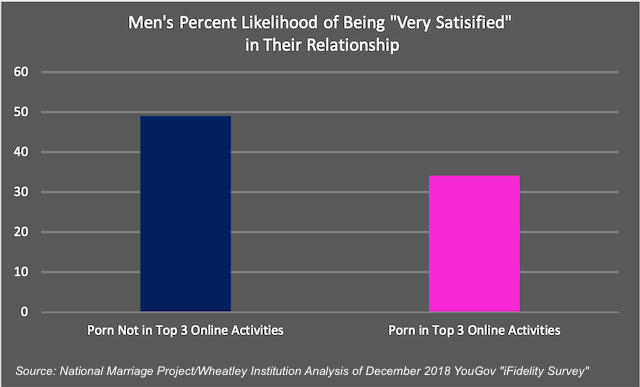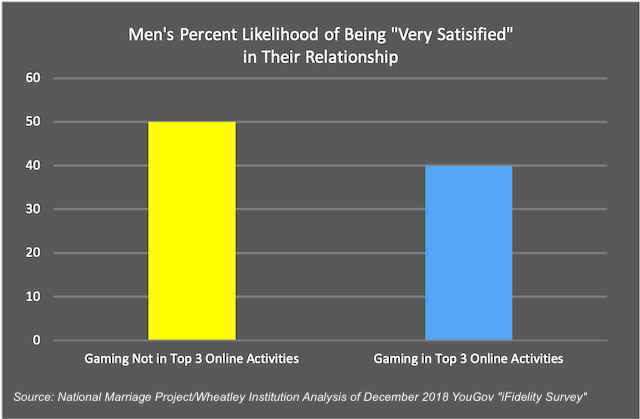Highlights
- When men reported pornography as one of their top three online activities, they were 15 percentage points less likely to report being “very satisfied” in their relationship, compared to men who did not list porn as one of their top three online activities. Post This
- For men, the type of online activity is more important than the amount of time spent online—at least when it comes to relationship quality. Post This
Has the rise of screen culture—smartphones, gaming, and tablets—hurt relationships? It’s an important question as research shows that the current cohort of young adults (i.e., Millenials and iGen) are dating less, marrying less, and having sex less than older cohorts did when they were the same age. These studies, which have focused on unmarried individuals, have speculated that these relationship trends are due—in part—to the contemporary experience of omnipresent interactive technology.
But how does screen culture influence relationship quality among cohabiting and married individuals? And is it a matter of how much time people spend on virtual reality or what they do on screens that matters for their relationships in the real world?
To answer these questions and more, we turned to new data, the “iFidelity Survey,” sponsored by The Wheatley Institution and the National Marriage Project and collected by YouGov in late-December 2018. The survey consisted of a nationally-representative sample of 2,000 adults. For this analysis, we focus on the cohabiting and married participants (1,159 individuals).
Time Online
Interactive technology may pose relationship problems because it takes away from couples’ relationship time together. That is, the more time couples spend on devices rather than with each other, the less able they are to nurture their relationships. Alternatively, interactive technology may actively disrupt couple interactions. Indeed, one study found that when individuals use their cell phones as they interact with their romantic partners, relationship quality declined.
With this in mind, one of the questions we asked iFidelity participants was how much time they spent online when they weren’t at work. The answers ranged from no time at all (3% of the sample) to nine hours or more (slightly over 9% of the sample). The average was about 3.44 hours per day.
Then, we examined whether the amount of non-work time spent online was associated with individuals’ relationship happiness and perceptions of relationship stability. However, online time was not associated with either of these measures of relationship quality.
Online Activities
Although the “how much” question did not yield results, we also examined the “how you use technology” question, focusing on three activities: pornography, playing online video games (i.e., gaming), and the use of social media, as these are frequently cited as potential relationship problems. We found that two of these activities were related to negative relationship quality for married and cohabiting men but not women.
Pornography
Overall, 22% of cohabiting men and 11% of married men cited pornography use as one of their top-three activities. Consistent with other research findings, we found that men’s pornography use was negatively associated with their relationship quality. That is, when men reported pornography as one of their top three online activities (overall, 13% of married and cohabiting men reported this), they were 15 percentage points less likely to report being “very satisfied” in their relationship, compared to men who did not list pornography as one of their top three online activities.

Notes: Logistic regression model with education, age, & marital status controlled. Assumptions for the
predicted likelihoods are a man with "some college/associates degree," who is32 and married.
This finding could be interpreted multiple ways. First, it might be that men in unhappy relationships turn to online porn to compensate for their relationship dissatisfaction. Second, it’s possible that men’s online pornography use decreases the perceptions of their real-life intimacy because these men have a new standard for comparison (i.e., porn stars). Third, viewing online pornography may result in sex becoming more about men’s own physical pleasure and less about the emotional aspect of sex. Either the second or third reason could then decrease men’s relationship satisfaction.
Online Video Games
Gaming also looks potentially problematic for men. When men reported playing online video games as one of their top three online activities (25% reported this), they were 10 percentage points less likely to report being “very satisfied” in their relationships, compared to men who did not cite online gaming as one of their top three activities.

Notes: Logistic regression model with education, age, & marital status controlled. Assumptions for the
predicted likelihoods are a man with "some college/associates degree," who is32 and married.
Again, like with porn, one reason for this might be that men who feel dissatisfied in their relationships turn to online gaming as a form of compensation. Relatedly, men who are facing emotional or mental health issues might turn to gaming as a form of avoidance. Emotional and mental health issues are also associated with decreased relationship happiness. Alternatively, their spouses and partners may complain about their online gaming use, which may then decrease men’s relationship satisfaction.
Our findings do have some limitations. The biggest issue is that we do not know the direction of these associations. As we noted previously, online pornography use may harm relationship quality, as a number of studies have found, or men with worse relationship quality may turn to online pornography to compensate.
Furthermore, our measure of online pornography and video game use is admittedly rough. Instead of just noting whether they were in men’s top three online activities, frequency data on each activity would have been a more precise measurement. Additionally, while the finding regarding online pornography use and relationship quality is consistent with many other studies (see here and here, for example), the online gaming finding needs replication.
In spite of these limitations, these findings do suggest that, for men, the type of online activity is more important than the amount of time spent online—at least when it comes to relationship quality. That is, what men do online is more important to their relationship quality than how much time they spend there. In particular, these findings suggest that gaming and pornography may raise red flags for men’s relationships.
Jeffrey Dew is an Associate Professor in the School of Family Life at Brigham Young University and a National Marriage Project fellow. W. Bradford Wilcox is director of the National Marriage Project at the University of Virginia and a senior fellow at the Institute for Family Studies.
*The authors would like to thank Dr. Brian Willoughby for his input on our findings.














